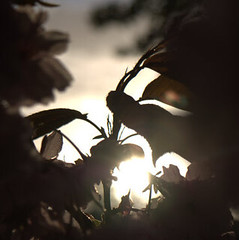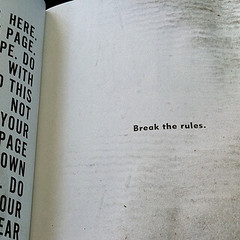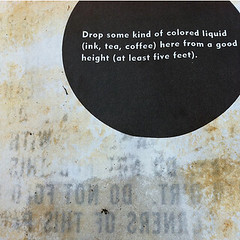1 Art
This afternoon while I sipped hot rooibos from a fancy gold-rimmed tea cup (Get on the bus, Gus. All the cool Tweetspeak kids are drinking tea now.), I thought to myself, “Gee, I wonder where I could get a complete listing of the 100 most iconic artworks of the last five years.” Imagine my delight when I came across just such a list of iconic artworks at Art Info. From a photo essay of images taken by Google Map’s nine-camera street view vehicles to a lingering-longer-than-I’d-like-it-to image of a flooded McDonald’s kitchen, this collection is comprised largely of “works that are participatory mass spectacles” vs. traditional painting. And while they are known to have inspired conversation in some significant way, I’m thinking I talk to all the wrong people. Anyway, next time my tea cup tips me toward wanting to peruse compelling artwork, I might just stop to see what Maureen Doallas has curated for All Art Friday.
Now, artist Frederico Pietrella did inspire some conversation the other day when my local librarian gave me a courtesy call to remind me that Sylvia Plath’s Collected Poems was mildly overdue. Six dollars later, I blame Mr. Pietrella for running off with all the library date stamps, so I didn’t know when Ms. Plath’s curfew was. The Italian artist creates stunning images using only a rubber date stamp. Since they can take up to two months to complete, he changes the date as he goes along to show the passing of time (and, likely, avoid overdue book fines).
2 News
Last week the literary community of the Berkshires gathered for WordFest at the Mount. Held at the Edith Wharton mansion in Lenox, Mass., the event featured panels, interviews and readings. (If I were reporting for my hometown newspaper, I’d tell you who poured coffee and that a good time was had by all.) Tweetspeak’s managing editor and I enjoyed listening to poetry readings on the same terrace where the Berkshire Eagle notes Edith Wharton and Henry James sat “on summer nights, reading Walt Whitman’s ‘Leaves of Grass’ aloud.” Not once did security try to escort us to the gate. We also heard from Norton Anthology editor and poet Mary Jo Salter and Adam Gopnik of The New Yorker, among others. Stay tuned for an upcoming book club on Gopnik’s bestseller The Table Comes First: Family, France, and the Meaning of Food later this year. We’ll even be giving away a copy signed by the author one day soon.
You might remember we reported in an earlier edition of the Top Ten on the discovery of a second portrait of Emily Dickinson. We stopped by the Amherst College Library during a brief literary tour following WordFest where the Special Collections staff graciously allowed us an after-hours viewing of the daguerreotype. Researchers in the Tweetspeak labs are currently conducting analysis on what may turn out to be yet another portrait of the reclusive Victorian-era poet.
When I said “Get on the bus, Gus” a bit earlier, I wasn’t kidding. Metrobus, a Canadian public transit line, has begun featuring the work of area poets on buses, including George Murray’s line, “Justice is never black and white, except on cop cars and killer whales.” Poet Mark Callanan, whose work is also featured in the Poetry in Motion endeavor, likens reading poetry while riding the bus to reading the cereal box over corn flakes. “To have it on buses kind of normalizes it, ” he said.
3 Publishing
Seems every time we turn around, book publishers have been given a new black eye. But it’s not all bad news. Lelia Mander, Senior Production Editor at HarperCollins, shares five great things about working for a book publisher, not the least of which is being paid to read. If you’re involved in publishing a book, you also get to watch the “journey of the written word” up close, almost like your creepy neighbor, only not like that at all.
It starts in a private place, as an idea, a proposal, a concept. Then it appears in a manuscript or Word file, where it works to tell a story, describe a time in history, argue a political point, expose a crime, bring about total destruction…from there, it gets line-edited and copyedited so it can do an even better job. After that, it is designed and typeset so that it’s pleasing to read on the page. It gets proofread so it won’t embarrass the author or editor, and then it’s published.
English professors get paid to read, too. T.S. Poetry Press is currently watching the journey of Karen Swallow Prior’s written word as her book inches closer to the press. An article on her forthcoming title, Booked, will appear in the October edition of Christianity Today. Sorry, we can’t pay you to read it at work, but you won’t want to miss it.
4 Business
Technical writing sounds so…oh, I don’t know. Technical. Maybe that’s because usually it’s printed in a twisted tangle of tiny fonts and enormous words. Tom Johnson of I’d Rather be Writing suggests that technical writing can be like poetry, applying a “philosophy of simplification and linguistic efficiency” in an effort to compress deeper meaning into fewer words. Anyone who can use Lying in a Hammock at William Duffy’s Farm in Pine Island, Minnesota by James Wright to teach technical writing is worth a read.
5 Creativity
Please don’t tell Dr. Prior, but I haven’t read many of the classics. (Maybe if someone had offered to pay me…) So I was delighted to come across this handy guide from Huffington Post Books to help me fake my way through insightful discussion of classic novels.
Why not analyze Hemingway’s ability to craft concise dialogue, or Faulkner’s ability to pen poetic interior monologues without having read their work? Sure, it’s not the same as actually reading it, but life is short and books are often long.
And if the summary of Moby-Dick inspired you, maybe you’d like to hear the book read aloud in a marathon celebrity effort called Big Read. The Guardian reports Moby-Dick Big Readers will include Tilda Swinton, David Cameron, and David Attenborough.
Projects like this are the sort of thing that happen through the generation of creative ideas and problem solving. Jonathan Fields interviews Scott Belsky, founder of Behance and 99u. You won’t want to miss this video to learn “how to better organize your mind, reach your goals and filter your thoughts.”
6 Write-It
Does Twitter make your head (or your stomach) spin? Are you still trying to figure out if hashtag is one word or two? (It’s one, by the way.) When folks start using MT and RT, #WW and #FF do you want to phone a friend and buy a vowel? Even if you’re a Twitter genius, you need to read InkyGirl.com’s Writer’s Guide to Twitter.
Once you’ve finally pulled yourself away from Twitter and actually want to spend some time writing, we have some wonderful things going on right here at Tweetspeak to help get your pen leaking onto the page. Seth Haines has been writing on tea and poetry this month, and the community is brewing up some delicious lines from his poetry prompts like these from Megan Willome:
it didn’t feel like a Revolution
or Tea’s Role In A Healthy Lifestyle
when i did not put sugar in my tea.
i simply never did. (read the rest of Megan’s poem)
And just yesterday we kicked off a new book club guaranteed to get you writing poetry, Ordinary Genius by Kim Addonizio.
7 Poems
Once in a while, a special poem comes along that speaks so strongly to you that it’s difficult to cross the intellectual divide to convince yourself the poet didn’t write it just for you in that very moment. Perhaps the poet lived and wrote a century before you were born. Or has never met you. Or was simply thinking of someone else (or even no one in particular) while sipping her tea and penning the lines. But you still can’t help but wonder at how it speaks. Such was this poem that dropped into my inbox recently via Every Day Poem’s daily delivery.
My table is long,
my window open.
Read the rest of the poem Love Song by L.L. Barkat and see if it doesn’t feel like it was written for you, too.
8 People
When do you first recall being touched by poetry? Marie Howe remembers it from as early as her crib. She recounts seeing a framed image on the wall and the combination of words and pictures felt like “the grail.” Her mother had her memorize a poem every week and the experience crystallized to her that poetry “is the way to speak about reality.” Take some time and listen to Marie Howe’s interview with Michael Laskey at The Poetry Trust. It’ll take you about 13 minutes, but well worth the last line to find out Howe’s answer to the question, “What does poetry do?”
9 Education
Did you think the application of poetic philosophy to technical writing was a bit of a stretch? Then what do you think of engineering students writing poetry as a part of their projects? Drawing on the work of David Whyte, who championed the cause of poetry in the workplace in his book The Heart Aroused: Poetry and the Preservation of the Soul in Corporate America, engineering students at Drexel were introduced to poetry as a means of understanding how things work and developing creativity.
Indeed, the wrongfulness of stereotyping engineering students as not interested in writing poetry asserted itself as we took possession of the folder which contained the 500 original poems our freshman students had written. From the first poem to the very last, there was in each of them a voice converging science and language to express some new way of regarding the world.
But listen. If you think that poetry really just belongs in the traditional poetry classroom, well, we have something for you, too. Dr. Brett Foster of Wheaton College kicked off our new series, Poetry Classroom, right here in a nontraditional classroom setting at Tweetspeak. Stop in for the discussion of Li Po’s Hard Road. Class is in session all week.
10 Sound n Motion
Folks who love to know how things work seem to also love to know where things came from. And for word lovers, it’s all about knowing where the word came from. The Mysteries of Vernacular series features exquisite but whimsical paper craft animations to trace the history of various words. You’ll enjoy this brief study of the origins of the word hearse.
What great poetic picks have you found this week? Be sure to share them with us in the comments.
Photos by Claire Burge. Used with permission. Post by Will Willingham.
__________________
Buy a year of Every Day Poems, just $5.99— Read a poem a day, become a better poet. In September we’re exploring the theme The Poet.
- Earth Song Poem Featured on The Slowdown!—Birds in Home Depot - February 7, 2023
- The Rapping in the Attic—Happy Holidays Fun Video! - December 21, 2022
- Video: Earth Song: A Nature Poems Experience—Enchanting! - December 6, 2022











Megan Willome says
Well, I was getting ready to write my comment when, wow! Thank you for featuring my little tea poem.
I love it when you do these tour-de-poetry thing. I especially loved the HuffPo’s abbreviated explanations of books. And may I heartily recommend NPR’s Linda Holmes. I download her “Pop Culture Happy Hour” podcast every week.
Will Willingham says
I was going to tweet you this morning:
@meganwillome Bagatelle.
Glad you enjoy the tour-de-poetry. (Love that.) It’s a fun tour to chart. I’ll have to check out the happy hour podcast.
Maureen Doallas says
Great round-up. I pulled the Pietrella link aside the other day to use in one of my own spotlights. Amazing what he does with those rubber stamps.
LL’s next book has to be a volume of love poetry. I keep saying that so she’ll have to produce a collection, yes?!
Thank you for the shout-out for All Art Friday. There are so many wonderful artists.
Will Willingham says
Maureen, you keep nudging that way. Something tells me that would be a volume to savor.
I loved that date stamp art. I wonder if I picked it up from you?
KSP says
Ahem … Dr. Prior can read blog posts, too (even though she doesn’t get paid to), and she saw that!
Will Willingham says
Well, perhaps I’ll just audit your course. 🙂
And I promise to read your book when it releases. Might help me more than HuffPost.
KSP says
And for the record, you couldn’t pay me enough to read Moby Dick!
Donna says
Ooooo thanks for the cheat sheet! I never read them either…maybe… I can’t remember! LOL! 😀
KSP says
Shameless plug: yes, read my book and you can get a crash course on some of the greats! 🙂